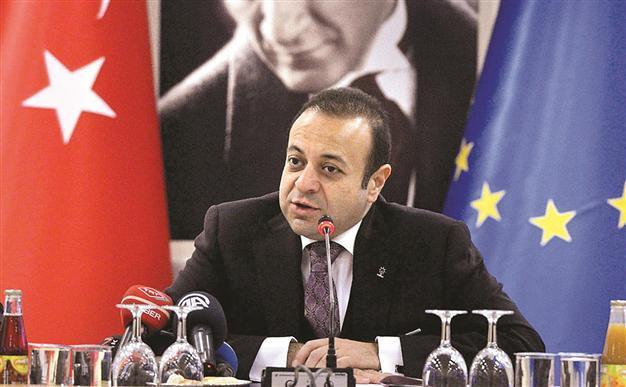Greek Cyprus sets terms for lifting EU block
NICOSIA - Anadolu Agency

Turkish EU Minister Egemen Bağış is seen in this file photo. Greek Cyprus has demanded Turkey agree to strenuous terms if it wants to continue its EU bid. AA photo
A senior Greek Cypriot diplomat has laid out the conditions to remove the blockages on chapters to Turkey, which include the implementation of the Additional Protocol and the transfer of the closed city of Varosha (Maraş) to the United Nations.A chief negotiator, Andreas Mavroyiannis, said the Greek side had approved of the start of European Union negotiations with Turkey eight years ago in the hope that it would speed up the resolution of the island’s crisis.
In return for allowing the opening of eight chapters with Turkey, Mavroyiannis said the Greek side would ask for the implementation of the Additional Protocol, which requires Turkey to open its ports to Greek Cypriot ships, as well as the transfer of Varosha to the United Nations. After Turkey fulfills those two things, Greek Cyprus will allow the free circulation of products from Famagusta port, on the Turkish side, in European Union markets, which would enable the north to engage in foreign trade. Maraş, a suburb of the Famagusta port area, was evacuated during the Turkish intervention. Ankara has said that Varosha is not on the agenda of the Turkish side, and it can only be one part of any ultimate solution of the Cyprus dispute.
Mavroyiannis said the resolution should come in the form of a two district federation under the U.N. structure, which would allow for two equal federal units in the administration of the island. “Such a compromise is necessary,” the negotiator said.
The Cyprus issue, however, is not the only obstacle on Turkey’s path to the EU, he stressed, while adding that its resolution would greatly improve Turkey’s chances.
“The Cyprus issue is not the only obstacle for Turkey’s EU membership. There are others. But if the Cyprus issue is resolved, it would provide for the strongest acceleration to Turkey’s accession process.”
Turkey signed the Additional Protocol back in 1963 and allowed for its expansion over 10 EU states in 2005. At the time, Turkey had also released a declaration stating that the signing of the protocol did not in any way imply an official recognition of Greek Cyprus.
















